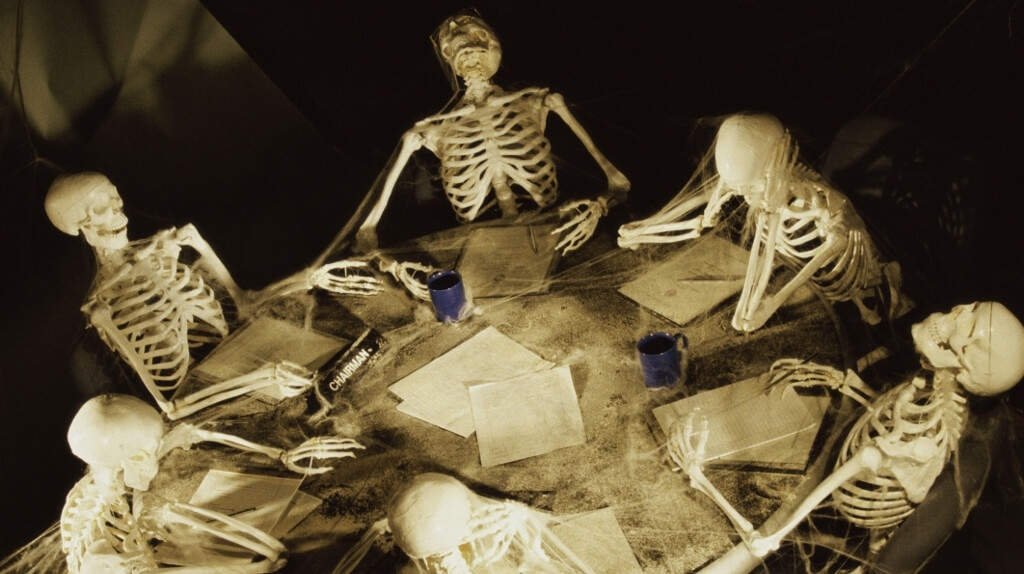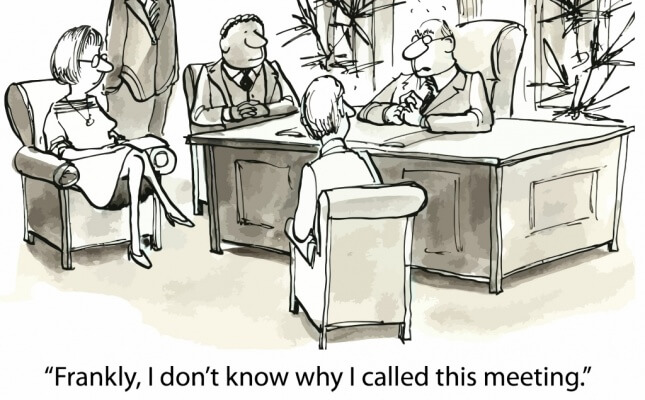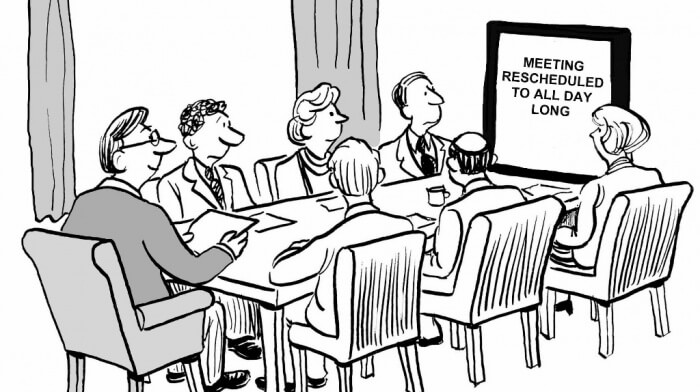No one looks forward to a meeting, least of all a three-hour monster with no leadership or direction. Isn't it time we all did something about it for the sake of our sanity? The movement starts here.
A Movement For Better Meetings
No one looks forward to a meeting, least of all a three-hour monster with no leadership or direction. Isn't it time we all did something about it for the sake of our sanity? The movement starts here.

I am putting a call out to start a Meetings Movement. In every business I work with, people tell me time and again that ineffectual meetings are their number one complaint. They sigh about peopling arriving late (10 minutes seems totally acceptable to many).
People don’t quite know why they have been included, there isn’t necessarily anyone in charge and the meeting room environment seems to be sapping people’s energy. Research suggests that managers within businesses spend between 50% and 75% of their time in meetings - the higher the level of seniority, the higher the percentage of meeting time. 42% of these meetings produce no actionable results.
The general attitude towards meetings is laissez faire; an acceptance “that is just the way it is”. They suffer through and jump from one to the next, then go home and whinge about it.
The Dutch have a word for it: 'vergaderziekte' or 'meeting sickness'.
When I ask people why this is a problem, they answer with fairly logical reasoning: meetings aren’t good for communication and efficiency. However, it is very rare that people step up and do something about ‘vergaderziekte’. They blame others. “It’s just our meeting culture”.
The lack of movement in meeting culture is down to the fact that we need to step beyond the logical rationale for improving meetings, and reach people emotionally – not an easy thing to do!
Let me ask you some questions to prompt that:
- How many hours of meetings are you in per week?
- What percentage of your time in the office does that work out to?
- What percentage of those hours in meetings are truly productive?
If the answer to question number 3 is less than 50%, then my provocation is that most of your time at work is being wasted. Recent research claims that more than half (56%) of all employees admit to being late to meetings (and other work events) at least once a week, and 23% said they perform badly in meetings after arriving late. Some 48% went on to admit that this adversely affected the performance of their colleagues.
Next, my line of questioning shifts:
- Are you working late due to the amount of meetings you are in?
- Do you sacrifice things like hobbies because of your work?
- Does work time eat into your family time?
Ouch. Now people are interested!
Who can make your meetings better? It’s certainly not the ‘culture’ because a culture doesn’t have a conscience. It’s the people within it. YOU.
If we could collectively turn a score from 40% productive meetings to nearer 60%, people will be happier and more productive in and out of work. So how do we do this? There are hundreds of posts suggesting “5 top tips to make your meetings better” but often these are inflexible and too logical. Every meeting is different.
We need to go beyond tactics and form a movement – to make people take responsibility.
Ghandi famously said “be the change you want to see”. Don’t wait for an internal initiative or training course to improve meetings. Make yours brilliant. Become famous, with a hit rate that no one else is achieving. Yes - you could be the 60% guy! Some tips to help you on your way:
Make your own meetings the best
- Always be in the room a few minutes early and make sure the environment is conducive to what you are about to do.
- Start on time, no exceptions.
- Set up: Be clear on brief/purpose, why people are in the room, how people need to think or behave.
- Any technology should be there to help rather than hinder.
- Keep energy pepped throughout.
Wake-up and shake-up
One of the reasons why meetings are generally poor is that they haven’t been challenged. We are creatures of habit, and so we unconsciously “go through the motions” every single day. The human brain is only about 3% of people’s body weight yet it uses 20-25% of our daily energy supply.
Our constantly innovative society bombards our minds with information. We now consume about 100,000 words a day from various media, which is a massive 350% increase over what we processed back in 1980.
So to cope, we slip into the easiest route possible, using as little thought as we can and we fail to see the available information all around us. We are numbed.
Ask people who taught them how to run a meeting and they will normally have picked it up via osmosis from their boss, who picked it up from their boss and so on. The easy route.
Look at all the traditional norms and challenge them.
Why choose a meeting room with a table?
Why 15 people?
Why one chairperson?
Why the same chairperson?
Why rounded to the nearest hour?
Why seated?
Why do people choose the same seats as last week?
Why are people reading word for word from a PowerPoint?
Provocations will make your meetings more kick ass.
Make it real for your leaders
Now you are the shining light. People mention your “meeting magic”. It’s time to take the fight further up the business. Ask senior people those questions I posed earlier. Get them to feel the pain. It is estimated that meetings cost businesses £15,979 per head, every year. Translate this into a real cost to your business when meetings produce minimal results.
- Do a short survey to find out what percentage of time in meetings is truly productive and then share your results.
- Expose the fact that people are becoming less productive and less engaged. Put a cost against that. If it’s ok that meetings start 10 minutes late, and there are 6 people in attendance, you have just wasted an hour of business.
- Run a meeting for your senior team and let them experience what a great meeting feels and looks like.
- Suggest some standards that you think everyone should live up to.
- Get their support to spread your movement to everyone around you.
A year down the line, people will thank you for being the person who stepped up and challenged the meeting sickness that had crept in to your business. They will thank you for the fact they can now enjoy their work as well as their home life. You will be promoted. They may even build a statue of you in reception. You started a Meeting Movement. Congratulations!
Thanks for signing up to Minutehack alerts.
Brilliant editorials heading your way soon.
Okay, Thanks!



